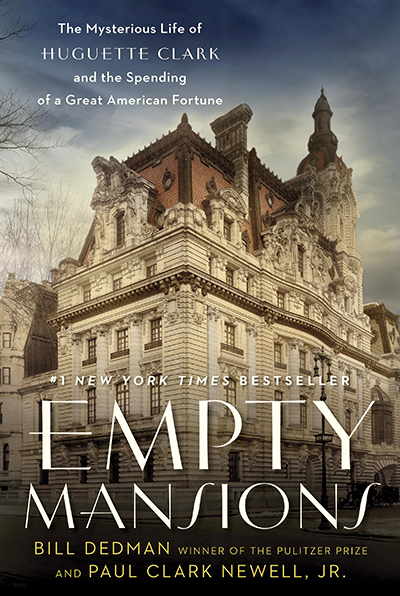When Pulitzer Prize-winning investigative journalist Bill Dedman noticed a grand estate in Connecticut that had sat empty for nearly 60 years, he stumbled into the era of Gilded Age opulence, copper barons and a reclusive 104-year-old heiress named Huguette Clark. His truer-than-fiction biography, Empty Mansions: The Mysterious Life of Huguette Clark and the Spending of a Great American Fortune, debuted at No. 1 on the New York Times bestsellers list. Though Huguette owned palatial homes, why had she lived for 20 years in a simple hospital room? Dedman collaborated with Huguette’s cousin, Paul Clark Newell, Jr, one of the few relatives to have conversations with her. The veteran of NBC News, now a senior writer at Newsday on Long Island, will give a photo tour of the Clark mansions on August 25 at Rago Arts in Lambertville, N.J.
Q. How did you come up with an idea of writing a book about Huguette Clark?
A. There had to be a book. The reader response was so surprising after my series of reports about Huguette Clark for NBC News. I received more than 2,000 e-mails and letters, and it was the most popular story ever on our website. It would have been enough to have a child of a forgotten Gilded Age copper tycoon living in a hospital for the last 20 years of her life, while her homes full of treasures and art sat unoccupied. But then her story became stranger. Add in a nurse who received $31 million in gifts, a felon accountant, an attorney who benefits from the will, a grasping hospital, a fiancé in France, and relatives seeking her fortune.
Q. Huguette seemed to literally have it all, why did she end up choosing to abandon all her mansions and the trappings of wealth and hide herself away?
A. She lived a life of imagination, of the arts, and clearly did not need to have her treasures by her side. Besides, she knew where every item was in the houses: the paintings by Monet and Degas and Renoir, the Stradivarius violins, the rare books, antique dolls and custom-made dollhouses. A shy artist trained as a painter, Huguette was, as she would say, “peculiar.” If you have an attorney who handles all your business for 25 years, and you’ve never met him, talking through a closed door, you don’t do well with new people. But she also could be surprisingly chatty, comfortable on the phone, a delight. It’s clear she had full command of her affairs well past age 100. Her decision to stay in the hospital was her own, but it doesn’t seem crazy. She set up an assisted-living cocoon, with round-the-clock nursing care. She was lucid and elegant, with a good sense of humor and an iron will.
Q. You collaborated closely with her cousin on this book. What were some of the most keen insights he shared on her mindset, especially in her later years?
A. Paul Newell was a wonderful collaborator, intent on making Empty Mansions faithful to the character of his cousin Huguette. He contributed two decades of research, including photos that Huguette sent him, and also their many conversations. The audio version of our book includes about 20 minutes of Paul and Huguette in conversation. You can hear how lively and engaged she is in their conversations. Huguette describe how she and her family had tickets on the Titanic’s scheduled return trip from New York back to France, and how, as she explains matter-of-factly, “We had to take another boat.”
Q. From the Great Gatsby film remake to the lingering Camelot mystique evinced in high prices recently paid at auctions offering JFK material, the American public is still fascinated with the Gilded Age and stories of powerful and rich family dynasties. Can you explain this?
A. Americans can’t bring ourselves to despise the wealthy, as so many of us aspire to be among them someday. Clearly there are connections to our own time. The Gilded Age, like today, was a time of growing income inequality, of politics corrupted by money, of rapid technological change. The richest Americans ever, the sinking of the largest ship yet — behind these superlatives, we’re attracted to the personal stories. And always a question lingers, as in Huguette’s life: If I had all that money, what choices would I make? Few of us would choose to live in a hospital room. We’d want a better view. But her story tells us something of the disabilities of great wealth, too.
Q. I hear a movie will be made based on your book. What details can you tell us?
A. Empty Mansions has been optioned for a feature film by Ryan Murphy, who created Glee and American Horror Story and made The Normal Heart for HBO. We’re waiting to hear the name of a director and star. Huguette Clark should make a great role for an actress. Or perhaps two actresses. The 1920s society girl, raised in the largest house in New York with 121 rooms for a family of four. And the 100-year-old artist living in the New York of 9/11 with her memories.
See photos of Huguette Clark, her homes and her treasures at www.emptymansionsbook.com.



